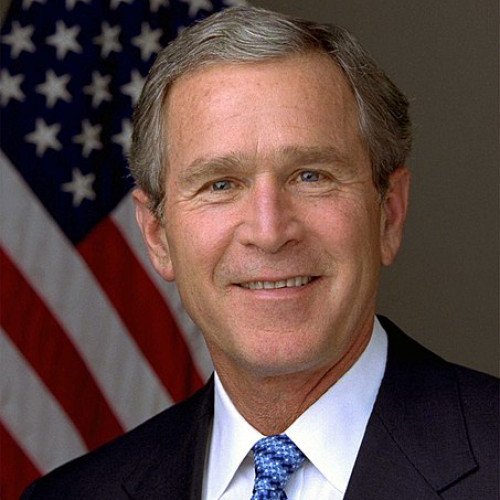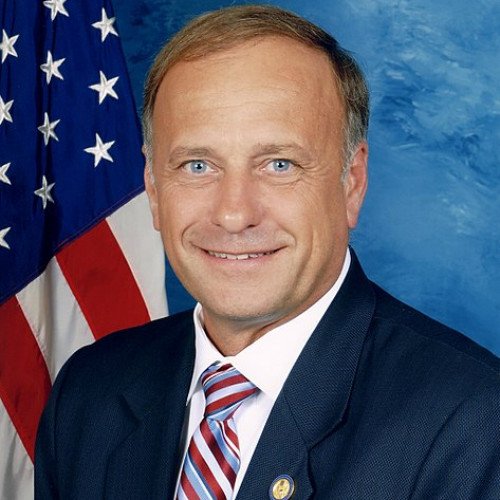George W. Bush VS Steve King

George W. Bush
George Walker Bush (born July 6, 1946) is an American politician and businessman who served as the 43rd president of the United States from 2001 to 2009. A member of the Republican Party, he had previously served as the 46th governor of Texas from 1995 to 2000. Born into the Bush family, his father, George H. W. Bush, served as the 41st president of the United States from 1989 to 1993. Bush is the eldest son of Barbara and George H. W. Bush. As such he is the second son of a former United States president to himself become the American president, with the first being John Quincy Adams, the son of John Adams. He flew warplanes in the Texas and Alabama Air National Guard. After graduating from Yale College in 1968 and Harvard Business School in 1975, he worked in the oil industry. Bush married Laura Welch in 1977 and unsuccessfully ran for the U.S. House of Representatives shortly thereafter. He later co-owned the Texas Rangers baseball team before defeating incumbent Ann Richards in the 1994 Texas gubernatorial election. As governor, Bush successfully sponsored legislation for tort reform, increased education funding, set higher standards for schools, and reformed the criminal justice system. Bush also helped make Texas the leading producer of wind powered electricity in the U.S. Bush was elected president in 2000 when he defeated Democratic incumbent Vice President Al Gore after a narrow and contested win that involved a Supreme Court decision to stop a recount in Florida. He became the fourth person to be elected president without a popular vote victory. Upon taking office, Bush pushed through a $1.3 trillion tax cut program and the No Child Left Behind Act, a major education reform bill. He also pushed for socially conservative efforts, such as the Partial-Birth Abortion Ban Act and faith-based welfare initiatives. In response to the September 11 terrorist attacks, Bush created the Department of Homeland Security and launched a "War on Terror" that began with the war in Afghanistan in 2001. He also signed into law the controversial Patriot Act in order to authorize surveillance of suspected terrorists. In 2003, Bush ordered an invasion of Iraq, beginning the Iraq War, with the administration arguing that the Saddam Hussein regime possessed an active weapons of mass destruction (WMD) program, and that the Iraqi government posed a threat to the U.S. Some administration officials falsely claimed that Hussein had an operational relationship with Al-Qaeda, the perpetrators of the 9/11 attack. No stockpiles of WMDs or an active WMD program were ever found in Iraq. Bush also signed into law the Medicare Modernization Act, which created Medicare Part D, and funding for the AIDS relief program known as PEPFAR. Bush was re-elected to a second term in the 2004 presidential election, defeating Democratic Senator John Kerry in a close race. During his second term, Bush reached multiple free trade agreements and successfully nominated John Roberts and Samuel Alito to the Supreme Court. He sought major changes to Social Security and immigration laws, but both efforts failed. The wars in Afghanistan and Iraq continued, and in 2007 he launched a surge of troops in Iraq. Bush received criticism from across the political spectrum for his handling of Hurricane Katrina, and the midterm dismissal of U.S. attorneys. Amid this criticism, the Democratic Party regained control of Congress in the 2006 elections. In December 2007, the U.S. entered the Great Recession, prompting the Bush administration to obtain congressional approval for multiple economic programs intended to preserve the country's financial system, including the Troubled Asset Relief Program (TARP) to buy toxic assets from financial institutions. Bush was among the most popular, as well as unpopular, U.S. presidents in history; he received the highest recorded approval ratings in the wake of the 9/11 attacks, but one of the lowest such ratings during the 2008 financial crisis. Bush finished his second term in office in 2009 and returned to Texas. In 2010, he published his memoir, Decision Points. His presidential library opened in 2013. His presidency has been rated as below-average in historical rankings of U.S. presidents, although his public favorability ratings have improved since leaving office.
Statistics for this Xoptio

Steve King
Steven Arnold King (born May 28, 1949) is an American politician and former businessman who served as the U.S. Representative for Iowa's 4th congressional district from 2003 to 2021. A member of the Republican Party, he represented Iowa's 5th congressional district until redistricting. Born in 1949 in Storm Lake, Iowa, King attended Northwest Missouri State University from 1967 to 1970 but left without graduating. He founded a construction company in 1975 and worked in business and environmental study before seeking the Republican nomination for a seat in the Iowa Senate in 1996. He won the primary and the general election, and was reelected in 2000. In 2002 King was elected to the U.S. House of Representatives from Iowa's 5th congressional district after the incumbent, Tom Latham, was reassigned to the 4th district after redistricting. He was reelected four times before the 2010 United States Census removed the 5th district and placed King in the 4th, which he represented from 2013. King is an opponent of immigration and multiculturalism, and has a long history of racist and anti-immigrant rhetoric and white-nationalist affiliations. The Washington Post described King as "the Congressman most openly affiliated with white nationalism." King has been criticized for alleged affiliation with white supremacist ideas, and has made controversial statements against immigrants, and supported European right-wing populist and far-right politicians accused of racism and Islamophobia.For much of King's congressional tenure, Republican politicians and officials were silent about his rhetoric, and frequently sought his endorsement and campaigned with him because of his popularity with northwest Iowa's conservative voters. Shortly before the 2018 election, the National Republican Congressional Committee withdrew funding for King's reelection campaign and its chairman, Steve Stivers, condemned King's conduct, although Iowa's Republican senators and governor continued to endorse him. King was reelected, but after a January 2019 interview in which he questioned the negative connotations of the terms "white nationalist" and "white supremacy", he was widely condemned by both parties, the media and public figures, and the Republican Steering Committee removed him from all House committee assignments. King ran for reelection but, campaign funding and support having declined, lost the June 2020 Republican primary to Randy Feenstra.